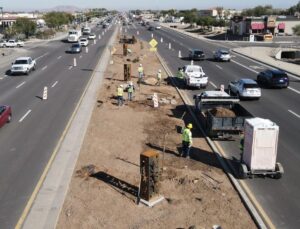Updated 11:15 a.m., Feb. 21, 2023
Maricopa residents could see a reduction in their food and housing-rental bills in the coming year—but at the expense of some key city services.
On Feb. 14, Arizona legislators passed Senate Bill 1184, which would prohibit cities and towns from collecting taxes on residential rental properties beginning Jan. 1, 2024. The bill was transmitted to the desk of Gov. Katie Hobbs on Feb. 20, who has five days to veto SB 1184 or it becomes law.
It could cost the city at least $739,000 a year in lost revenue.
This comes just three weeks after Senate Republicans introduced a bill that would slash municipal taxes on food sales in the name of inflation relief. Under the current bill language, SB 1063 would eliminate the taxes residents pay on food and select beverages at grocery stores.
That could cost Maricopa another $3 million a year in lost revenue if it becomes law.
In a press release issued Jan. 23, Senate Republicans estimated Arizonans could save as much as $700 per year after the two taxes are eliminated.
While that potential savings sounds tempting for taxpayers, it does cause worry among city leaders about the impact of services as soon as this fall, when the legislative session ends.
A small but mighty hit to Maricopa’s budget
Maricopa taxes consumers 2% on groceries and rent. In 2021, the city collected more than $500,000 in residential rental taxes and more than $2.5 million in grocery sales taxes. For 2022, those amounts were projected to reach $739,000 and $3 million, respectively.
“These are general-fund revenues that are used to fund either operating expenses or capital-improvement projects,” said Quinn Konold, communications and cultural services director for the city.
For a fast-growing community like Maricopa, a revenue stream that includes $3.7 million yearly is critical to ensuring the city survives associated growing pains.

In 2022, the budget showed that overall operating costs were an estimated $70 million, which includes maintenance, payroll and overhead costs for providing city services. Meanwhile, capital-improvement projects budgeted an estimated $74 million for major upgrades to city infrastructure, facilities and services.
And while $3.7 million may seem like a small hit, it can make the difference in how soon a streetlight is installed, or how often facilities are cleaned, or when new police vehicles can be purchased.
Mayor Nancy Smith said cities like Maricopa would be forced to make difficult choices in services it provides.
“Whenever the state oversteps into local government by forcing a change that negatively impacts city revenue,” Smith said, “it has the potential to not be able to offer the services our residents desire.”
Cities may not regain revenue loss
A January press release from Senate Republicans speculated cities and towns would regain lost revenue when its residents spend the $700 they save in other areas.
“Municipalities will not lose out on these revenues because the taxpayer will be spending what they get back, which, in turn, will be taxed via income and sales tax,” said Senate President Warren Petersen in the press release.

“These bills decrease city revenue without any consideration as to how the cities will replenish the funds,” Smith said. “Meanwhile, the state doesn’t lose any revenue.”
Konold said SB 1063, SB 1184 and HB 2067, as well as other bills being introduced by the Legislature, represent “a concerning pattern” that shifts “decision-making powers away from municipalities over to the state.”
“(We) believe that this charge is best served when the responsibility rests with individual municipalities, who understand the unique needs of their residents, rather than with the state,” Konold said.
Leaders in other communities and organizations agree.
The Arizona League of Cities, of which Maricopa is a member, said in a tweet Tuesday that SB 1184 “does not provide meaningful relief to those who need it. … It does take over $200M out of (municipal) budgets that would otherwise go to providing key services in those communities.”
Casa Grande Mayor Craig McFarland in a tweet Wednesday, estimated his city could lose approximately $1.5 million.
While cities wait to see how they will have to adjust their budgets and temper residents’ expectations, Hobbs has not indicated whether she will sign or veto the bills.

![Shopper Diana Villegas looks over produce at the new Sprouts Farmers Market in Maricopa. The store opened early Wednesday morning and gave discounts to its first shoppers. [Ian Roberds] Sprouts Farmers Market Opening](https://www.inmaricopa.com/wp-content/uploads/2021/08/Sprouts1-scaled.jpg)
![Maricopa’s ‘TikTok Rizz Party,’ explained One of several flyers for a "TikTok rizz party" is taped to a door in the Maricopa Business Center along Honeycutt Road on April 23, 2024. [Monica D. Spencer]](https://www.inmaricopa.com/wp-content/uploads/2024/04/spencer-042324-tiktok-rizz-party-flyer-web-218x150.jpg)






![Who’s the Best Mom InMaricopa? Nominate now! Marlene Marshall, Christina Olivares, and Meghan Bremer. [Bryan Mordt]](https://www.inmaricopa.com/wp-content/uploads/2023/05/BCM_8465-218x150.jpg)




![Alleged car thief released without charges Phoenix police stop a stolen vehicle on April 20, 2024. [Facebook]](https://www.inmaricopa.com/wp-content/uploads/2024/04/IMG_5040-218x150.jpg)
![Maricopa’s ‘TikTok Rizz Party,’ explained One of several flyers for a "TikTok rizz party" is taped to a door in the Maricopa Business Center along Honeycutt Road on April 23, 2024. [Monica D. Spencer]](https://www.inmaricopa.com/wp-content/uploads/2024/04/spencer-042324-tiktok-rizz-party-flyer-web-100x70.jpg)


